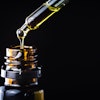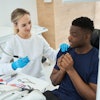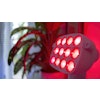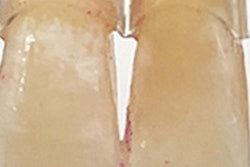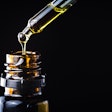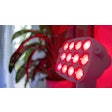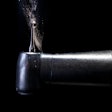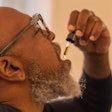Magnetic nanobots -- tiny machines -- may be the solution for sensitive teeth by plugging “holes” in tooth enamel to provide instant relief, according to a press release from the Indian Institute of Science.
Researchers from the institute’s Center for Nano Science and Engineering (CeNSE) in Bangalore, India, and technology startup Theranautilus have engineered magnetic nanobots, called CalBots, that can travel deep into dentinal tubules, forming durable seals for worn enamel, which may offer long-term relief after just one treatment.
“This is a compelling demonstration of what nanorobotics can achieve and how they could significantly impact future healthcare,” Ambarish Ghosh, a professor at CeNSE and a corresponding author of the study, said in the release.
In the study, published in Advanced Science, the research team tested the technology first on human teeth. Using 20 maxillary teeth extracted for various clinical reasons, they deliberately exposed the dentine.
Then, they applied the CalBots via a magnetic field for 20 minutes. The bots, measuring 400 nm, were loaded with the bioceramic formula and guided using the magnetic field deep into exposed tubules, reaching up to 500 µm inside the tubules. Once they were positioned, the bots then assembled to create a cementlike plug blocking the tubule, creating a seal that mimics impermeable enamel.
Next, they tested CalBots using mice. Mice were separated into groups, with one group undergoing induced tooth sensitivity. Mice were given a choice between drinking room temperature water or cold water. Mice with altered tooth sensitivity chose room temperature water, eschewing cold water.
“After we treated the sensitive mice with our CalBot solution, they started drinking cold water again -- the treatment worked like a charm,” Shanmukh Peddi, first author of the study and co-founder and CEO of Theranautilus, said in the release. “We saw 100% behavioural recovery. That was a big moment for us.”
The bioceramic formula used by the CalBots contains ingredients that are generally recognized as safe, a designation used by the U.S. Food and Drug Administration that ingredients in foods and consumer products have demonstrated safety for their intended use based on historical use and/or published research. The mice exhibited no adverse effects to the bioceramic material or treatment, the researchers said.
The study’s researchers envision a broader use of CalBots not only in dentistry but beyond it. The plugs formed by CalBots were impermeable, which could provide promising applications in providing the teeth and pulp tissue with extra armor, guarding it against bacteria. The technology could be promising in treating injuries as well as congenital dental conditions like amelogenesis imperfecta.
“We’ve created a regenerative, active nanomaterial -- a step towards the kind of ‘tiny mechanical surgeons’ Richard Feynman once envisioned,” Debayan Dasgupta, a former PhD student at CeNSE, co-founder of Theranautilus, and a corresponding author, said in the release.
